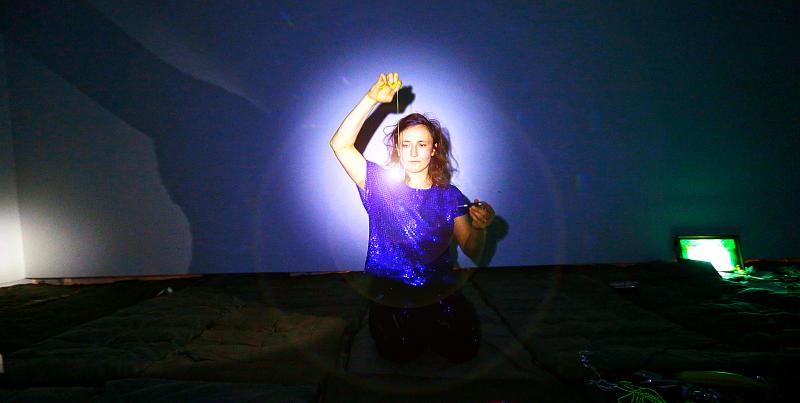
Pictured: Anna Nowicka in Dream States. Photo: Joanna Miklaszewska-Sierakowska.
10 October 2016
This October, the Nowy Theatre in Warsaw (ul. Madalińskiego 10/16) and curators Maria Stokłosa, Magdalena Ptasznik and Eleonora Zdebiak will host another installment of the Dance Activism. Spaces of Choreography cycle. The curators intended the cycle as a contemplation on contemporary choreography, in which artistic and discursive practices are integrally interlaced.
The events in this installment will focus on the presentation of Anna Nowicka?s Dream States. In the piece, four performers invite the audience to a journey through the unconscious. They explore the world of the senses and imagination. The dreaming process enables them to stumble upon unpredictable, surprising images which provide a foundation for movement practice and comprise the core of the show. The presentation will take place on 15 and 16 October (7 pm); two days later (Monday, 17 October,), the organizers will host two accompanying events. At 4 pm, Anna Nowicka will meet with the audience in a mezze meeting, enabling attendees to share their thoughts on the performance in an informal setting. Following the meeting, Anna Nowicka will hold a workshop on attentiveness and emotions flowing from the body, as well as the dream processes and the incessant flow of images they invoke (6 pm -9 pm, admission free).
This installment of Dance Activism will additionally feature a unique workshop with Bonnie Bucker, one of Anna Nowicka?s mentors in the context of her work with dreams. Also included will be independent workshops on spiritual and physical development: Relationships: A Story of the Body and Experience (15 October, 10 am ? 1 pm), Transforming Nightmares: An Introduction to Dreaming and Changing Your Life (16 October, 10 am ? 1 pm).
Detailed information on individual events:
Dance Activism. Spaces of Choreography
Curators: Maria Stokłosa, Magdalena Ptasznik, Eleonora Zdebiak
A series of six works by Polish choreographers Alex Baczyński-Jenkins, Ola Maciejewska, Anna Nowicka, Magdalena Ptasznik, Maria Stokłosa and Marta Ziółek. Performances will be accompanied by discussions, open original workshops with the artists and a series of articles published in Dwutygodnik.com.
Dance Activism
When we talk about choreography, in the context of invited performances, we are referring to the concept of activism ? an approach favouring activity and change over stability and permanence. Activism is not understood here as social or political engagement linked with focusing on certain themes. What we have in mind is an attitude that concentrates on provoking motion and setting in motion. The choreography we want to present takes changeability and instability as a prerequisite. It does not follow a single theatre convention, but it seeks and offers ways of embodiment that follow the logics of consistent search. It strives to expand the limits of forms that create meanings. It provokes and activates different ways of perceiving and experiencing movement, and, consequently, the body, space, time, the object and their relationships. We propose to shift attention from what movement in dance may represent, may mean, to how it achieves that ? how it is formed and manifested, how it changes and is subject to change. We are wondering in what fields choreography can function in current times.
Spaces of Choreography
The goal of this series is not to (re)formulate the definition of dance, but to ask the question what dance may be and what it may do, what performative force it manifests. We also want to put in circulation and develop the concept of choreography in a more conscious way.
Choreography, which literally means writing down the dance, is presently being appropriated by different fields, from social sciences to exact and natural sciences. In biological sciences, there is talk about, for example, molecular and cellular choreography; in physics ? about n-body choreography; in programming, there is the Web Service Choreography Interface ? a specification that describes the dynamics of interaction between Internet services. In his book Social Choreography: Ideology as Performance in Dance and Everyday Movement, Andrew Hewitt writes about choreography as a method of practicing ideology; and the Institute of Social Choreography in Frankfurt am Main explores the ways choreography may contribute to the development of non-standard social practices and systems.
In its relationship with dance, choreography often remains in the background. For example, until recently there were no choreography schools that admit candidates without educational background in dance. For us, it is interesting to shift the attention from dance to choreographic processes and practices. We see choreography as a technology of action, composing the directions / manifestations of movement in specific conditions ? navigating the processes, forming actions, providing the framework for events, organising the movement of elements that make up the situation created.
The series we offer sets the concept of choreography in the centre of attention.
Dance activism is a space for choreography.
Media patrons: taniecPOLSKA.pl, Dwutygodnik.com